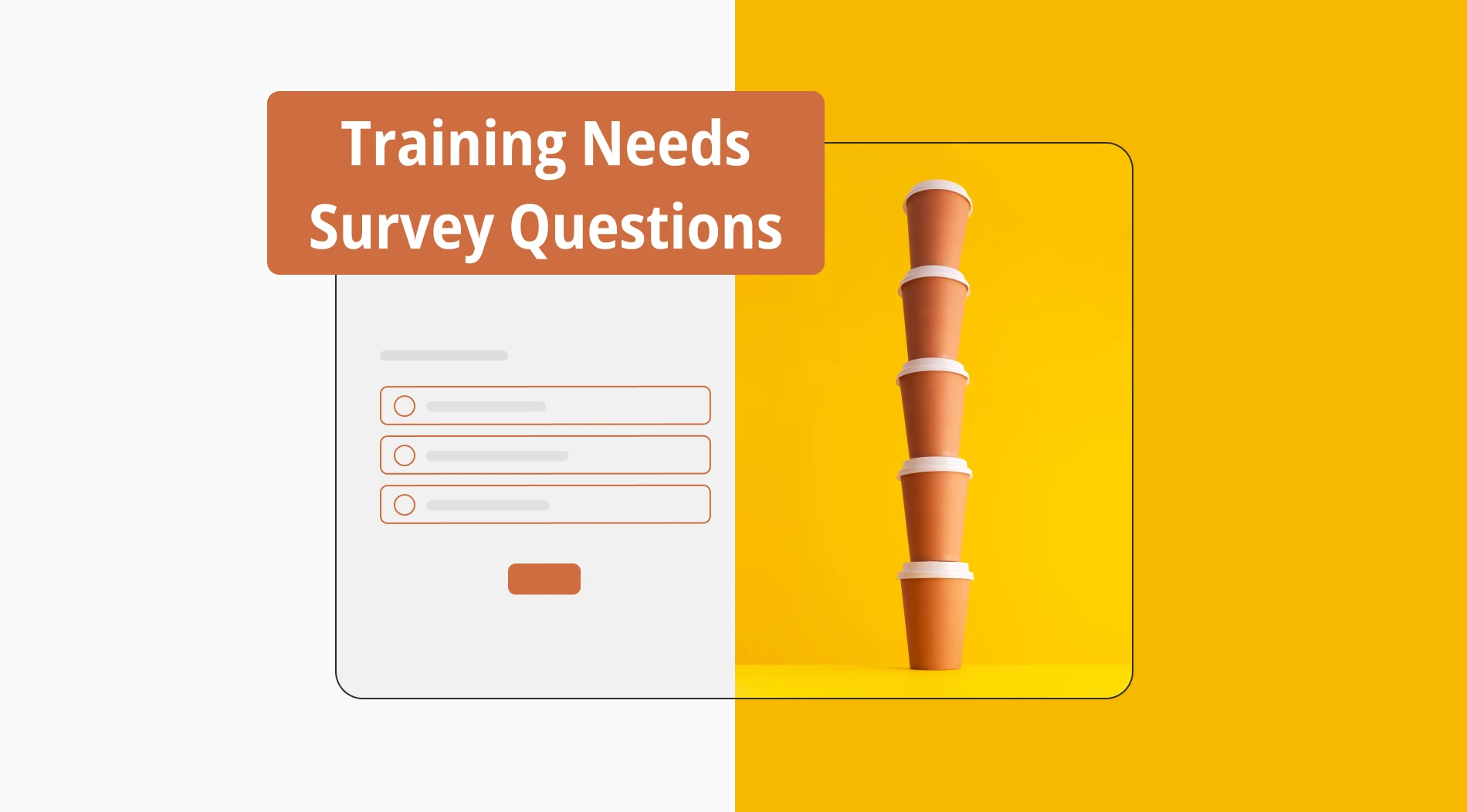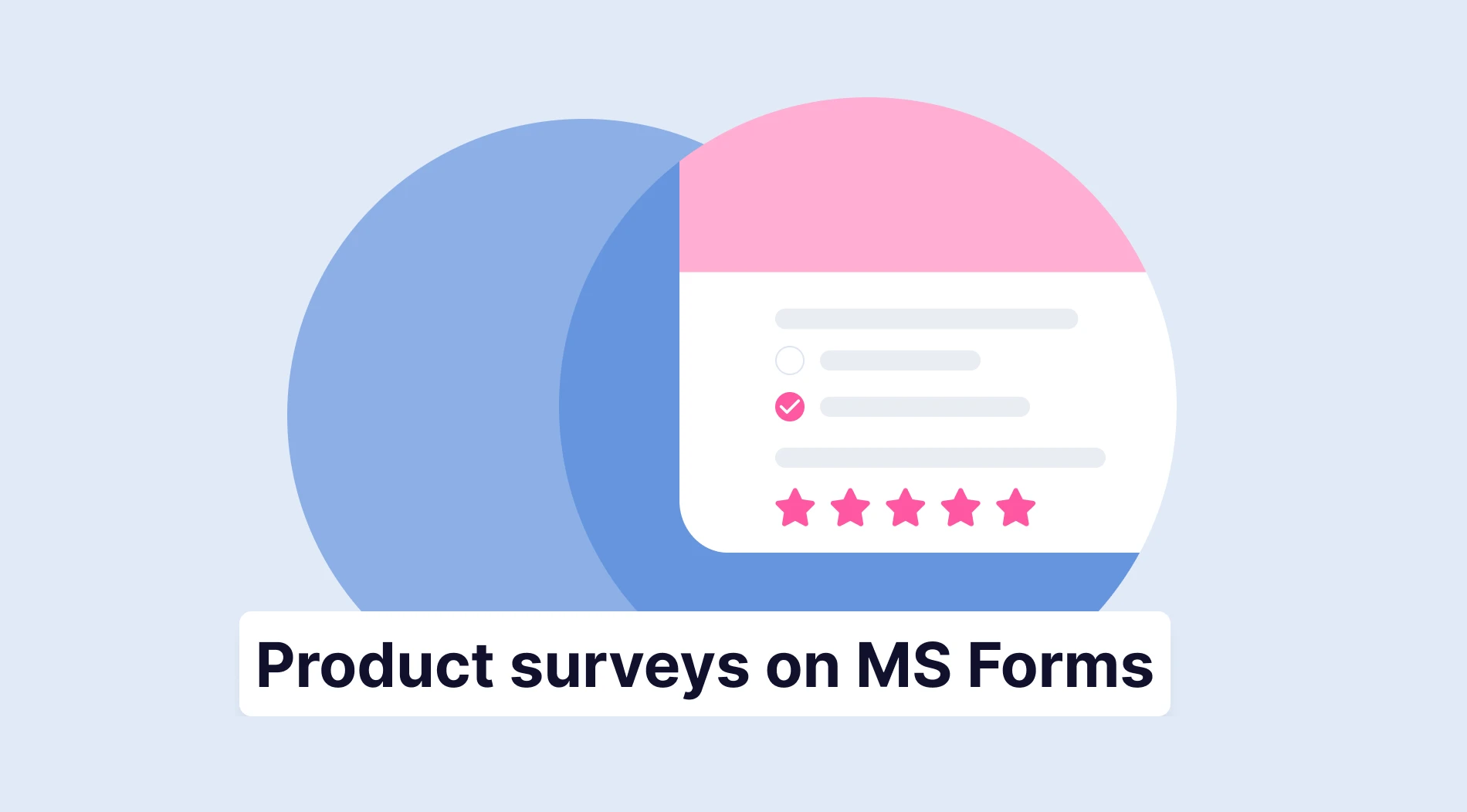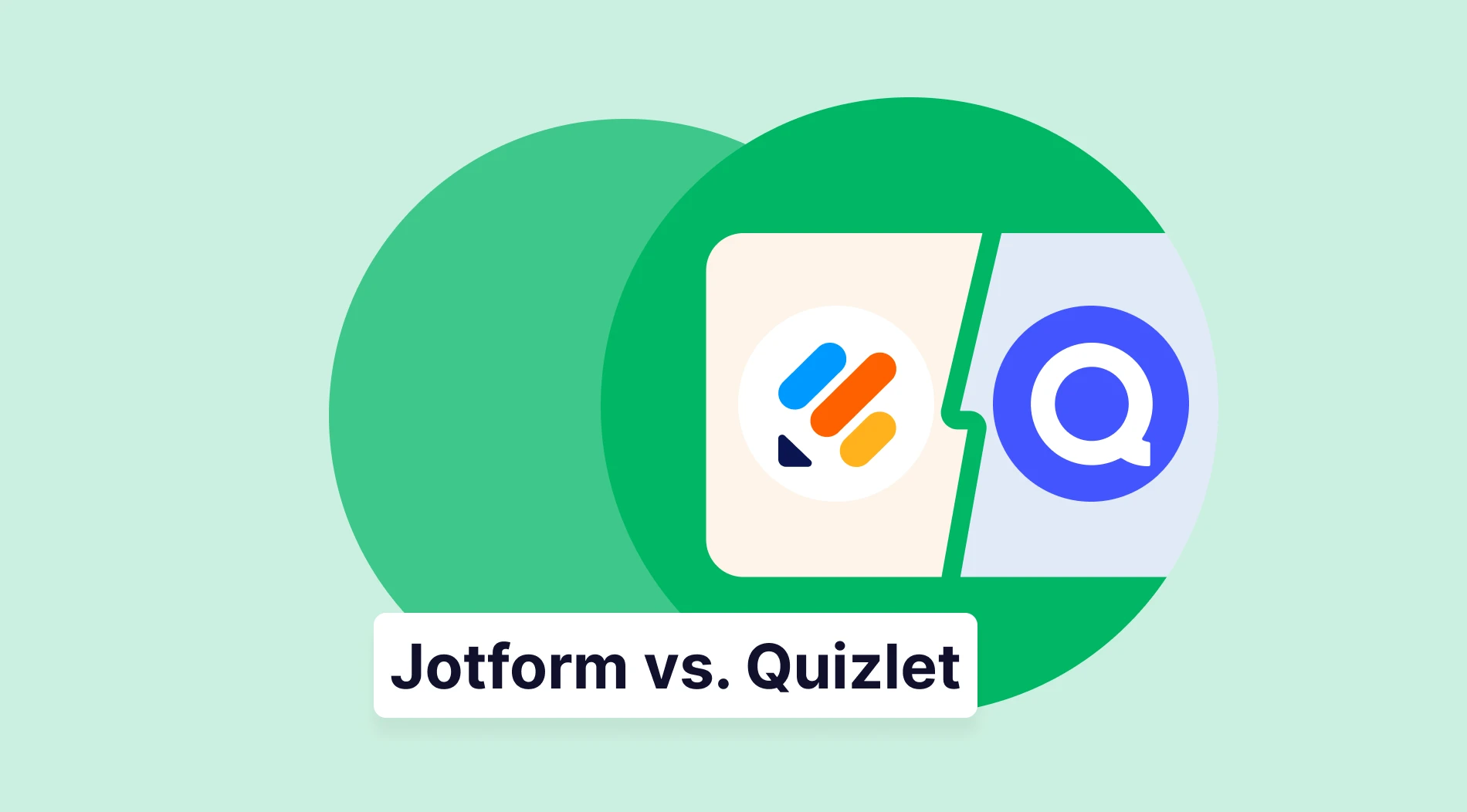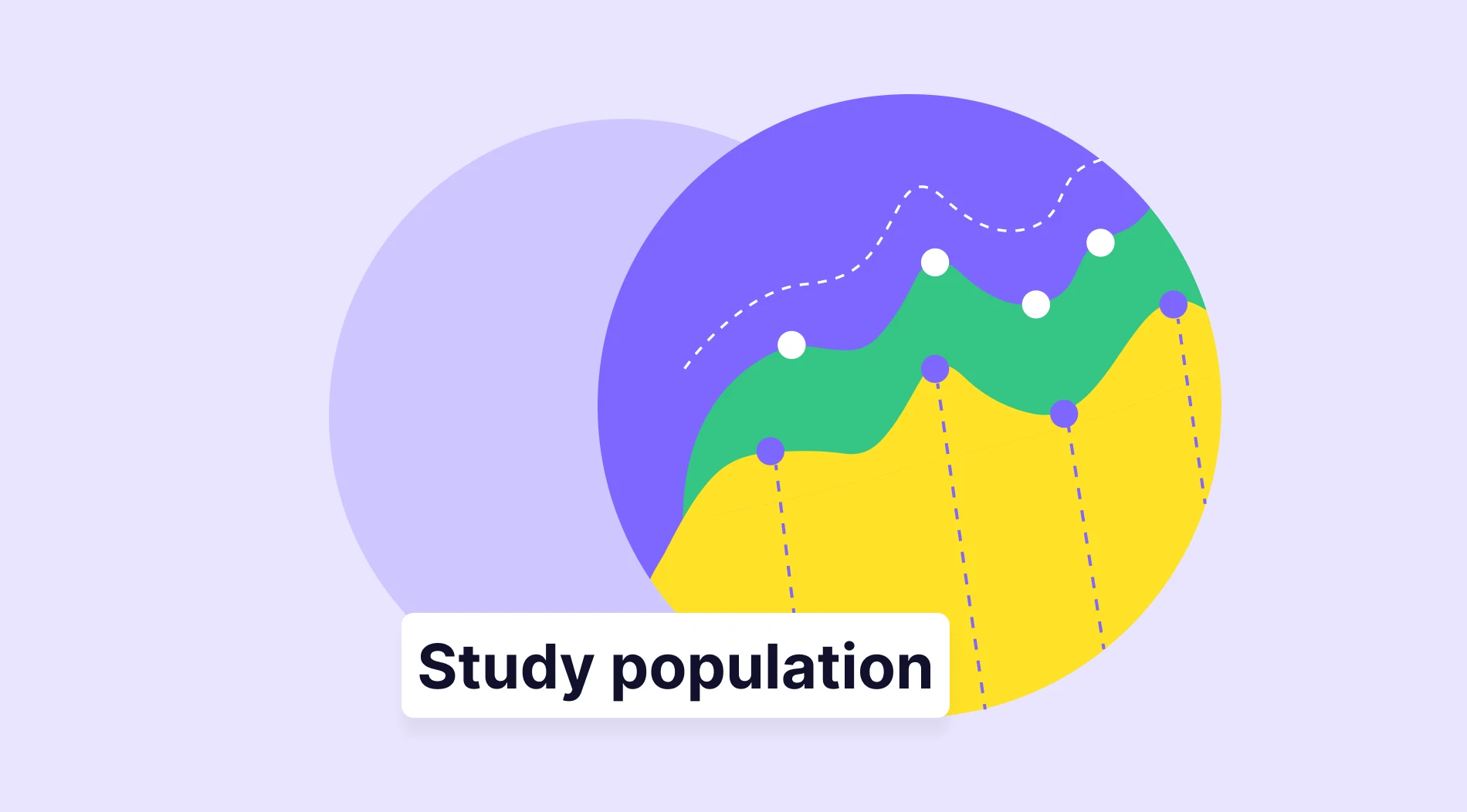An organization can rate training programs, determine necessary training, and identify knowledge and skill gaps in staff members by using a training needs survey. Surveys or interviews are typically used to collect data to ascertain desired performance levels and current competencies.
A carefully thought-out training requirements assessment guarantees that efforts are focused and successful, meeting particular organizational developmental needs. Organizations may make well-informed decisions on the allocation of resources on employee performance and organizational success.
What is a training needs survey?
A training requirements survey consists of a set of questions intended to evaluate employees' present capabilities, pinpoint areas for development, and obtain input on their favorite ways to learn.
Training needs surveys are divided into pre-training surveys and post-training surveys. Organizations can utilize a training requirements survey as a tool to find knowledge and skill gaps in staff members, decide what training is required, and rank training programs. Data is usually gathered via surveys or interviews to determine target performance levels and existing skills.
Why do you need a training needs survey?
A training needs assessment report is crucial to ensure that training programs are applicable and efficient, fill specific performance gaps, and improve overall performance. Identifying the most important areas for growth aids organizations in making resource allocation decisions. Survey questions for training feedback also help employees' talents match company objectives, which boosts output and increases work happiness.
In short, with specific training needs surveys, you can:
- Determine knowledge gaps and skill levels
- Improve training and development courses
- Boost employee performance
- Support career development
- Promote a learning culture
35+ Essential questions to ask in a training need survey
Creating a training needs survey that works is essential to determining and filling skill shortages in a business. By posing pre-training survey questions, you may obtain important information about your staff members' training needs and ensure that your development initiatives are meaningful and relevant.
This extensive list of 35+ crucial questions addresses a range of topics related to worker performance, preferred methods of learning, and organizational requirements, offering a strong foundation.
General questions to ask in a training needs survey
A training requirements survey's general questions are intended to improve data collection on workers' opinions, experiences, and general contentment with their present jobs and skill sets. If you are willing to explore how to conduct training needs analysis, these questions may help determine broad patterns and organizational development opportunities.
1. How satisfied are you with your current job role and responsibilities?
- Very satisfied
- Satisfied
- Neutral
- Dissatisfied
- Very dissatisfied
2. Do you feel adequately trained to perform your job effectively?
3. Do you feel supported by your manager in terms of your career development?
4. Would you suggest any seminars or training courses for your department or team?
5. Do you believe your company contributions have been acknowledged and valued?
6. Which initiatives or training programs, in your opinion, would improve the performance of the entire team?
- Training in management and leadership
- Workshops for team building
- Instruction in technical skills
- Development of communication skills
- Courses on project management
- Instruction in customer service
7. Do you require training on any particular tools or technologies to perform better at work?
8. What kind of coaching or mentoring would help you advance professionally?
9. How do you feel about the length and frequency of the present training sessions?
10. How often do you receive feedback on your performance?
- Weekly
- Monthly
- Quarterly
- Annually
- Never
11. After employee training sessions, how would you rank the efficacy of the feedback mechanisms?
12. How satisfied are you with the organization's career advancement opportunities?
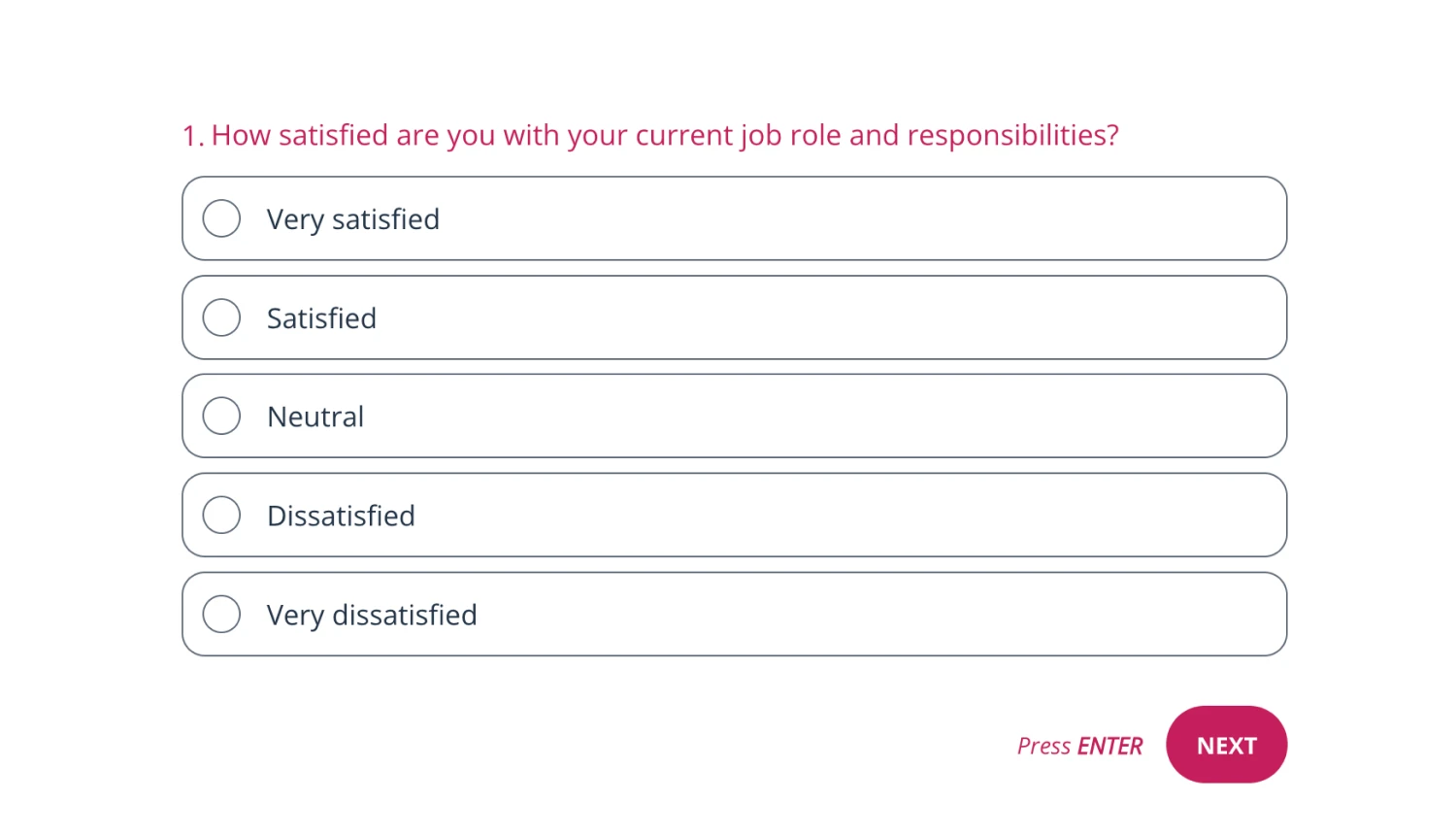
A general question about training needs
Training needs survey questions for employees
Creating a training evaluation form for employees can help you evaluate the abilities, know-how, and proficiencies staff members need to carry out their jobs well. These questions seek to determine areas for improvement, comprehend employees' preferred learning methods, and find gaps in present competencies.
13. What areas of your job do you find most challenging?
14. Could you order the languages listed below based on your degree of proficiency?
- English
- Spanish
- French
- Mandarin Chinese
- German
- Japanese
15. How successful do you think the current onboarding process for new hires is?
16. What effect has training had on your general level of job satisfaction?
- Very positive
- Positive
- Neutral
- Negative
- Very negative
17. What training formats do you find most effective?
- In-person workshops
- Online courses
- Webinars
- On-the-job training
- Mentoring
18. What is your opinion on the organization's training resources' accessibility?
19. How well do you feel supported by your manager?
20. How often do you think training should be updated?
- Annually
- Every six months
- Quarterly
- Monthly
- As needed
21. Do you believe receiving further training materials would increase your productivity at work?
22. Have you attended any training in the last six months?
23. Is the training schedule sufficiently flexible to accommodate your job schedule?
24. How likely will you recommend the current training programs to a colleague?
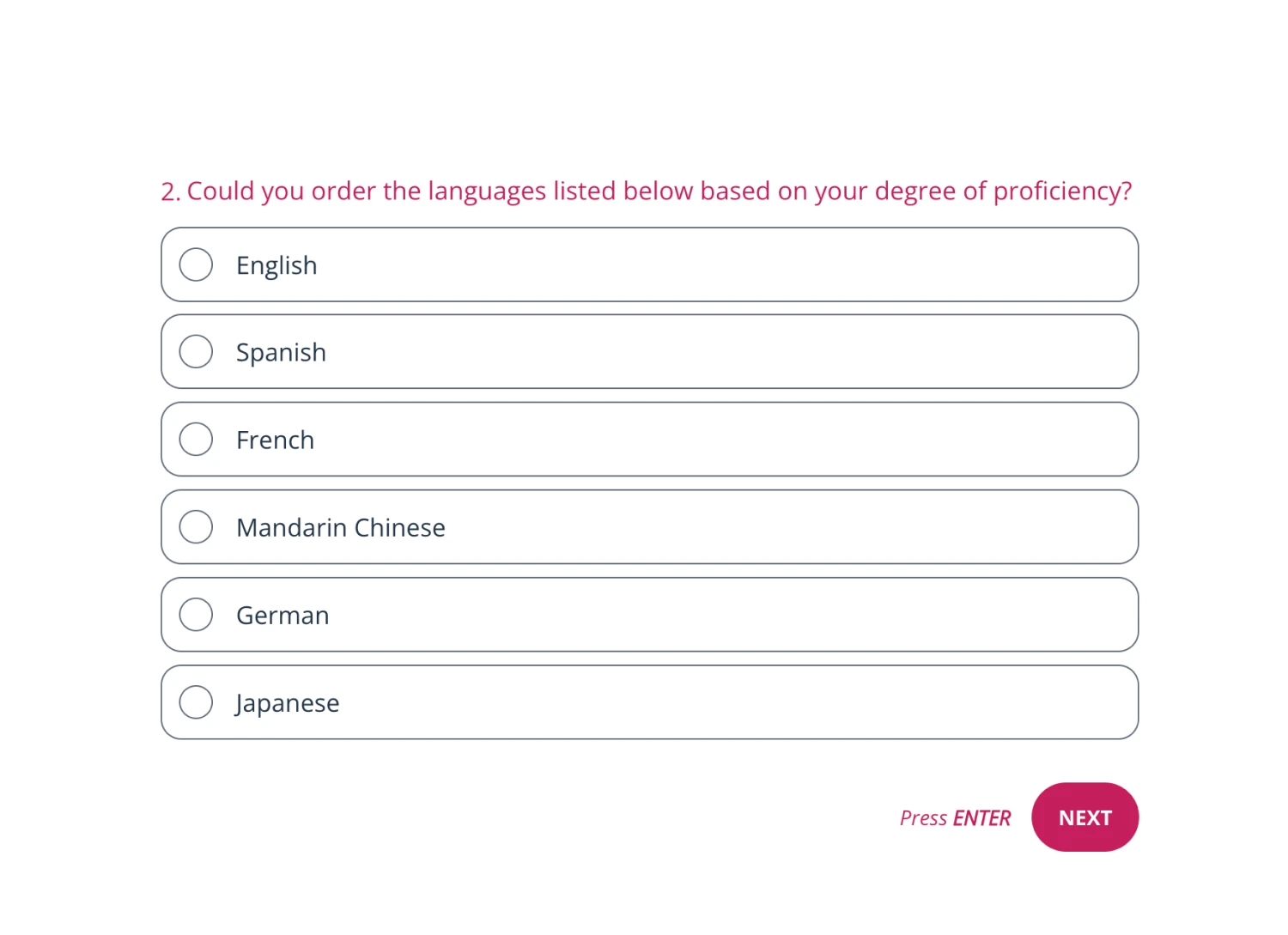
A training needs question for employees
Training needs assessment questions for teachers
Teacher training needs assessment questionnaires for teachers are tailored questions designed to determine educators' individual professional development requirements. These questions center on classroom management, subject matter knowledge, teaching approaches, use of technology in the classroom, and compliance with curricular requirements.
25. How do you stay motivated and passionate about teaching?
26. How do you assess student learning and progress?
- Regular tests
- Homework assignments
- Class participation
- Projects
- Other
28. What challenges do you face in using data effectively?
29. Do you involve parents and guardians in their children's education?
30. Which cutting-edge teaching techniques or approaches would you want to see used?
31. What strategies do you use to support students with special needs?
32. How do you integrate interdisciplinary learning into your lessons?
33. What particular aspects of classroom management do you think need greater instruction?
- Practice examinations
- Techniques for taking tests
- Review meetings
- Consistent curriculum alignment
- Other
34. In what ways do you get students ready for standardized testing?
35. To what extent do you feel comfortable handling conduct in the classroom?
- Very comfortable
- Comfortable
- Neutral
- Uncomfortable
- Very uncomfortable
36. How do you keep informed of the most recent advancements in the field you study?
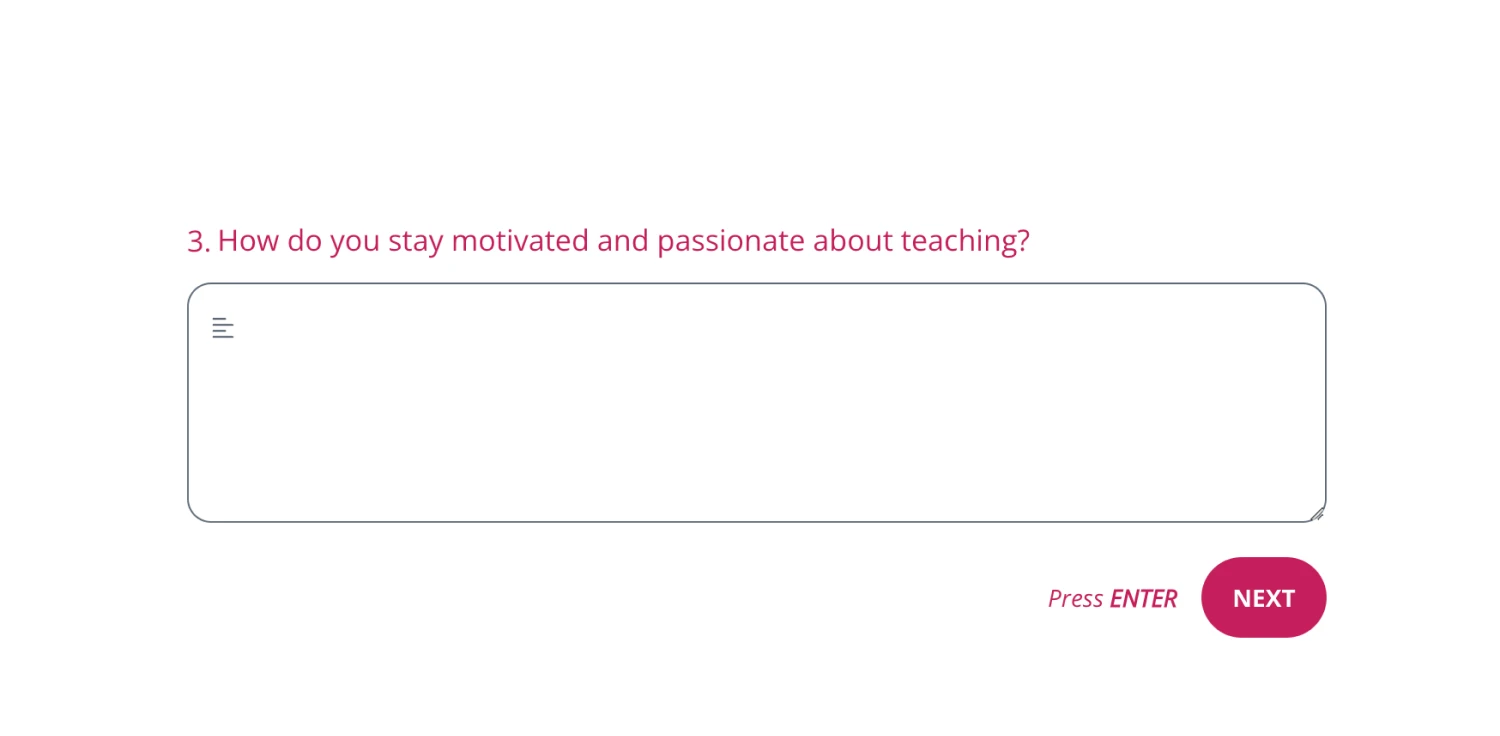
A training needs question for teachers
How to create a training survey without coding
Using a training needs assessment tool, such as forms.app, creating a training survey without coding is simple. With the help of this user-friendly platform, you can create and disseminate surveys effectively, ensuring that you get the information required to determine which areas of your company require training. You may build a training survey on forms.app by following these instructions.
1. Register or Log in: Register for a new account or log in with an existing one.
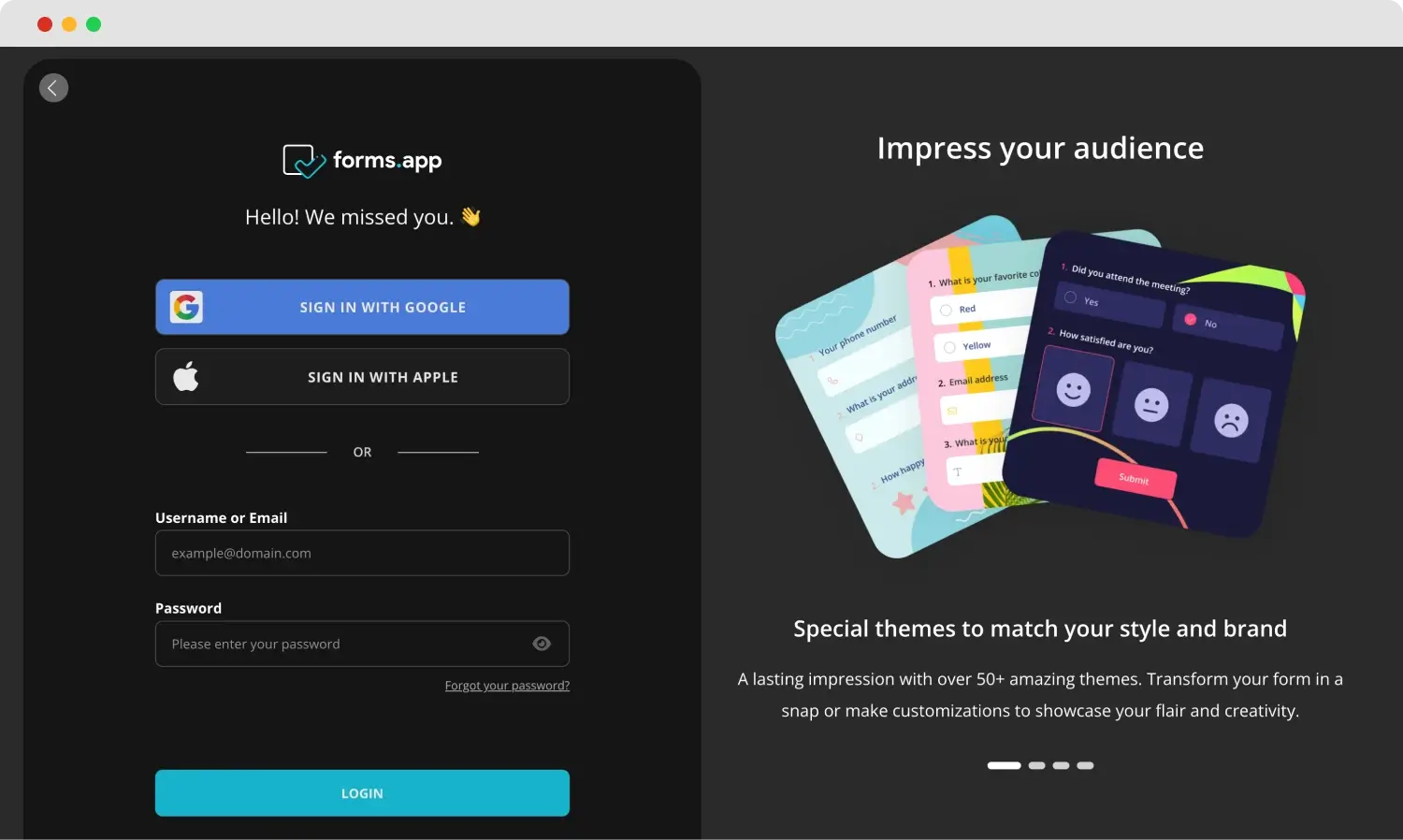
Log in to your account
2. Create a new form: The “Create Form” button opens a new survey. You could speed up the creation of your event survey by utilizing forms.app's AI feature. With the AI-powered tools from forms.app, you can easily and rapidly design survey forms tailored to your event's specifications. AI will create a customized form template for you in a flash. This facilitates the faster and more effective creation of your survey.
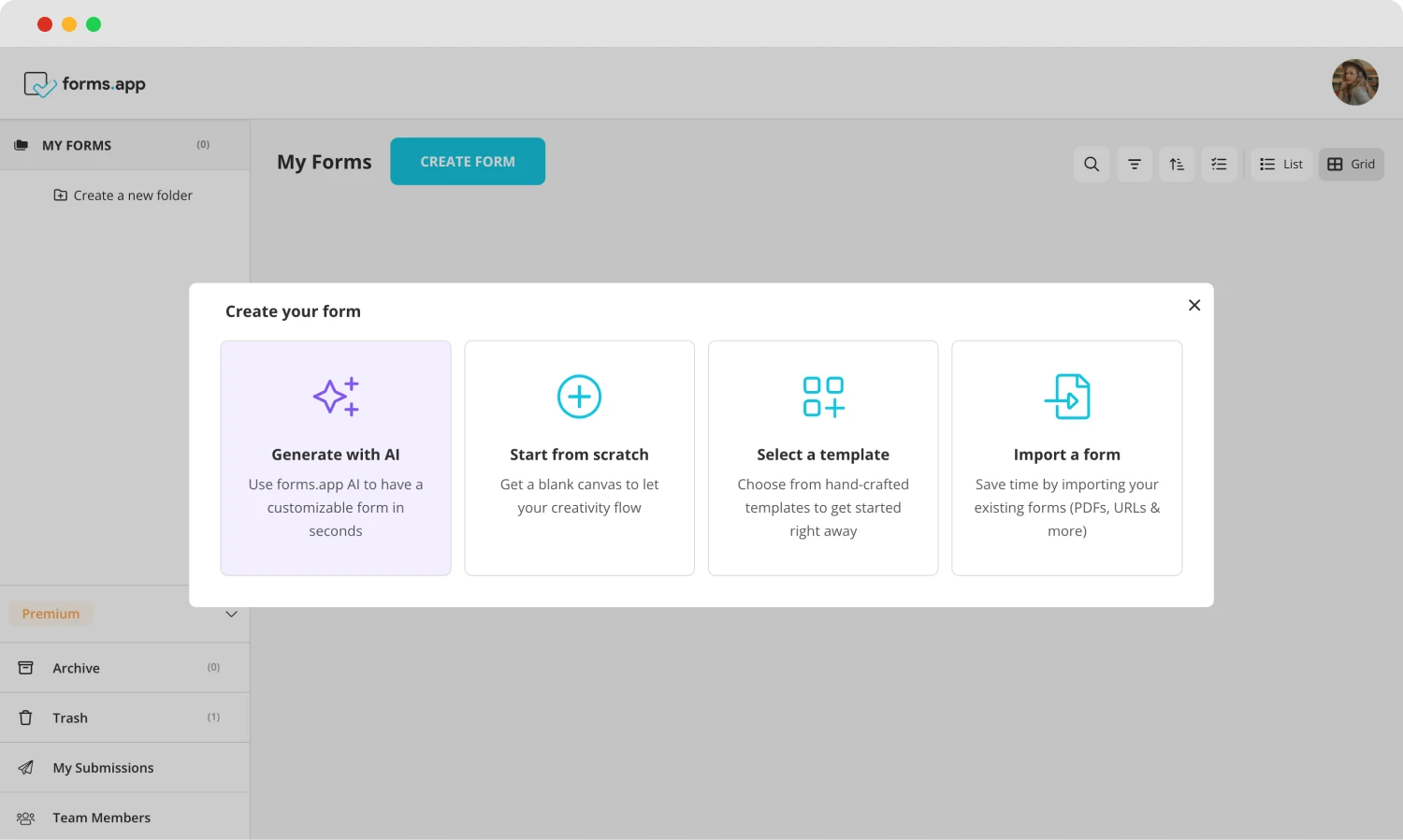
Choose a beginning option
3. Select a template: Either choose an appropriate training needs assessment survey template or begin with a blank form.
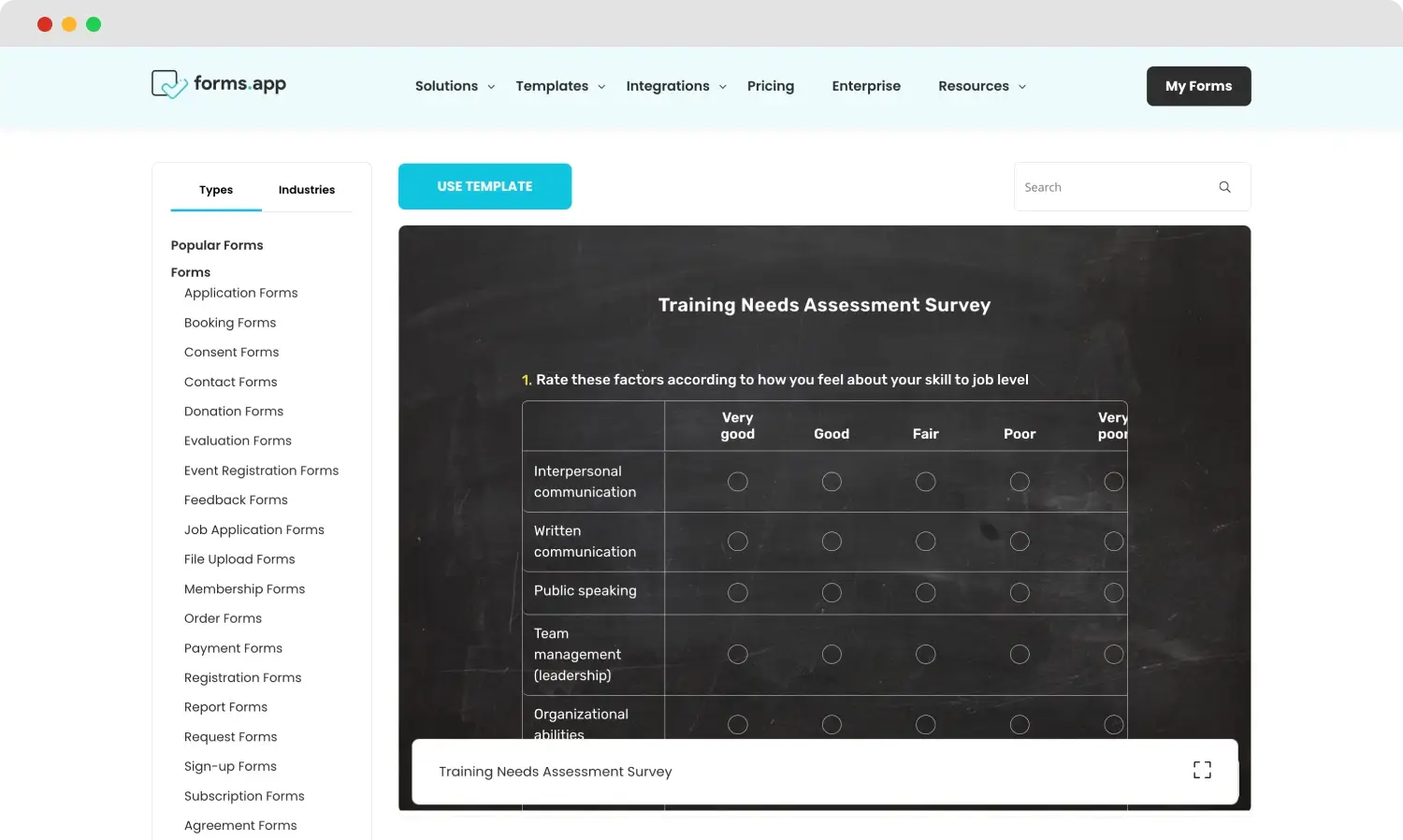
Choose a template
4. Add questions: You may add different question kinds, such as multiple-choice, rating scales, and open-ended questions, by using the drag-and-drop tool.
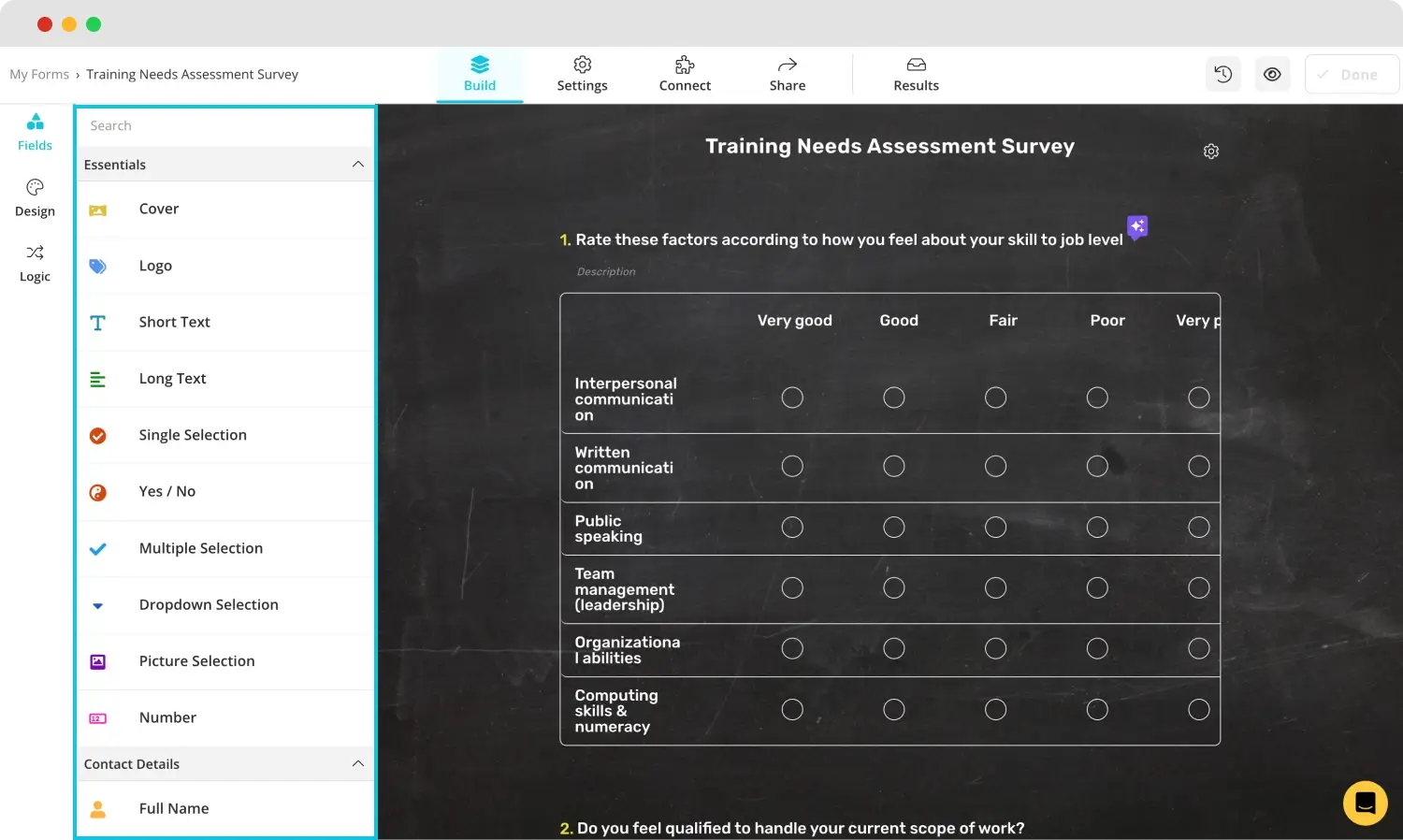
Add your questions
5. Personalize your questions: Enter the survey questions according to your training needs, modifying the parameters such as required answers and adding explanations as necessary.
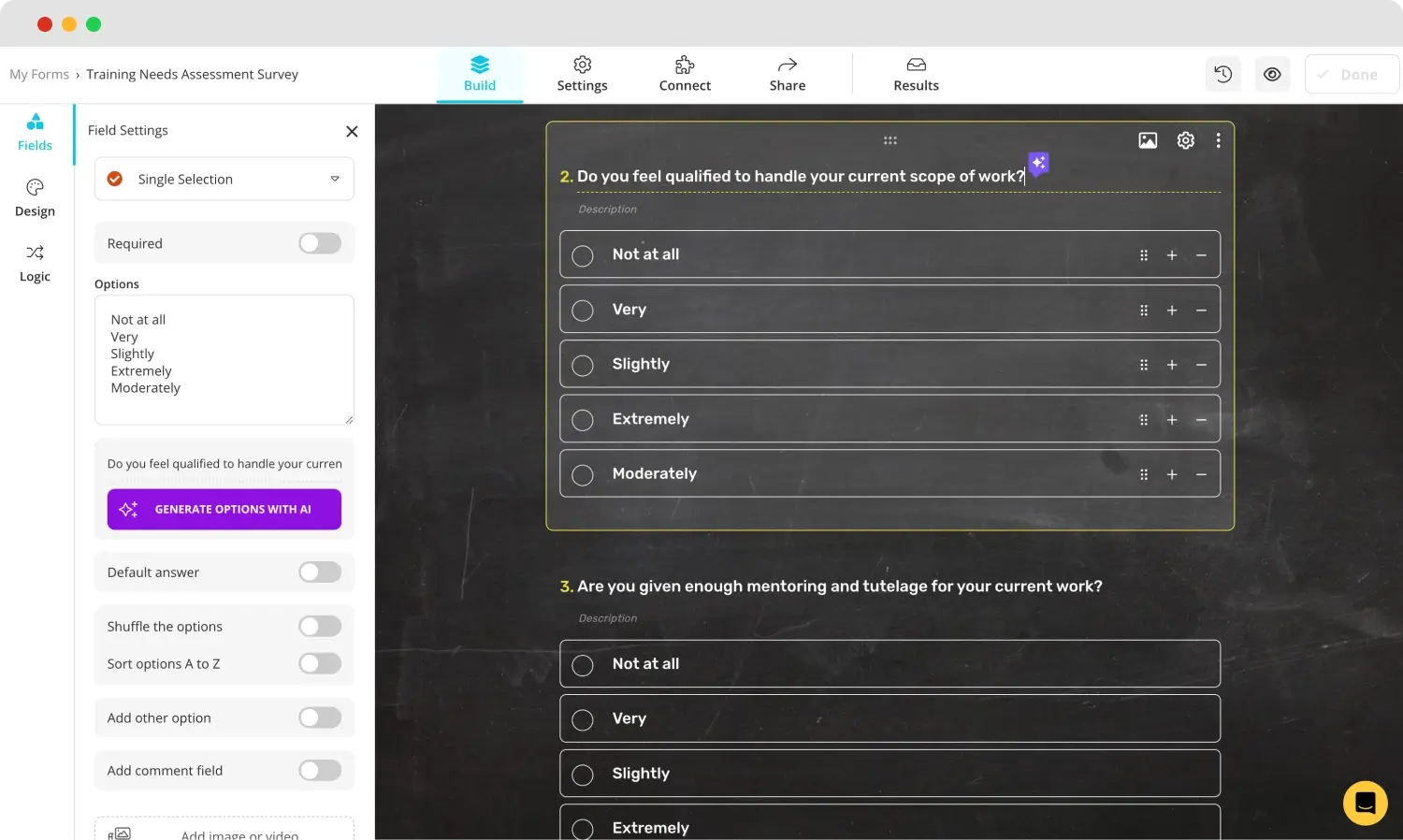
Customize the questions
6. Preview and publish: After checking the survey for correctness, save and publish it.
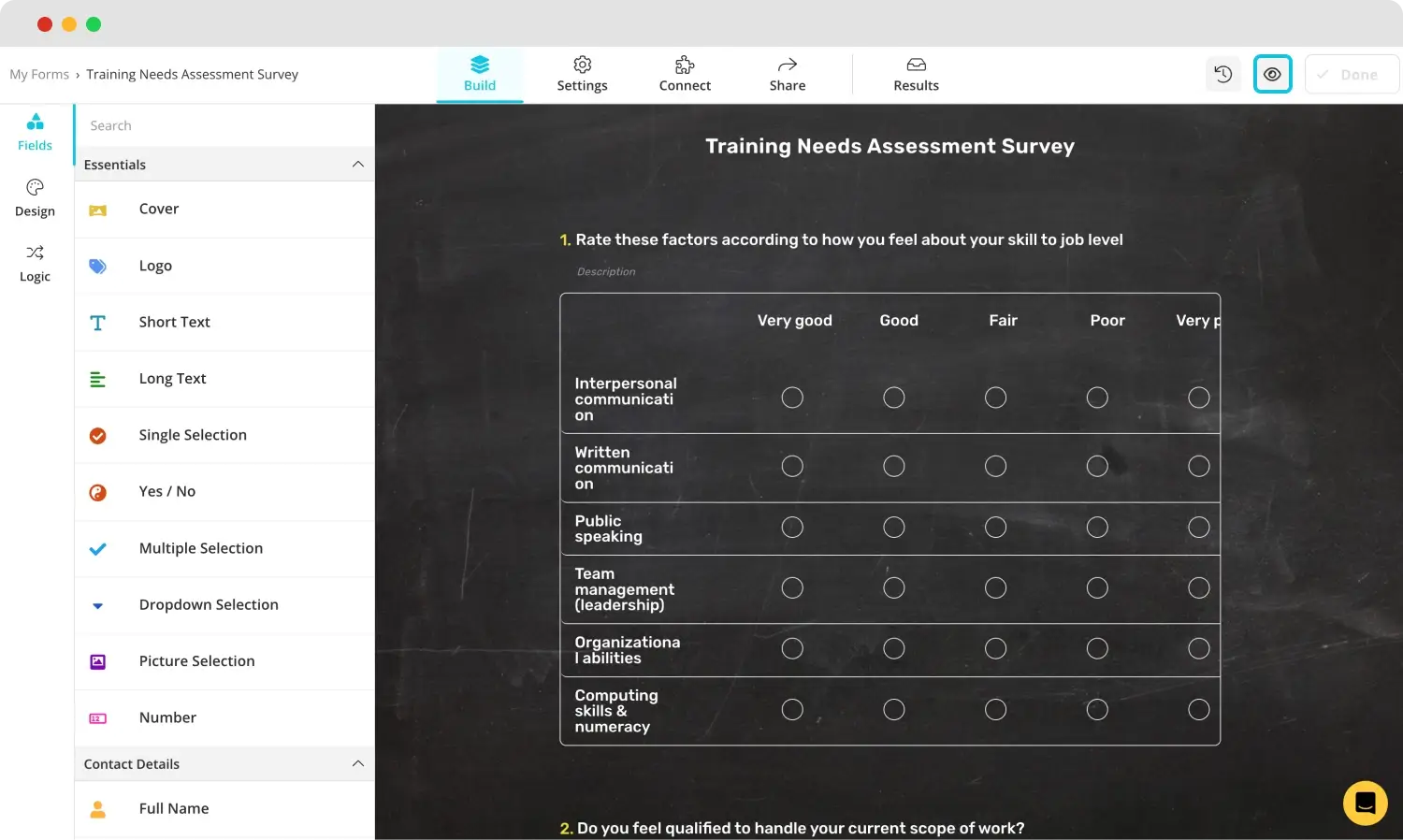
Preview to test your survey
7. Share the survey: For convenient staff access, send out the survey link via email or include it in your company's intranet.
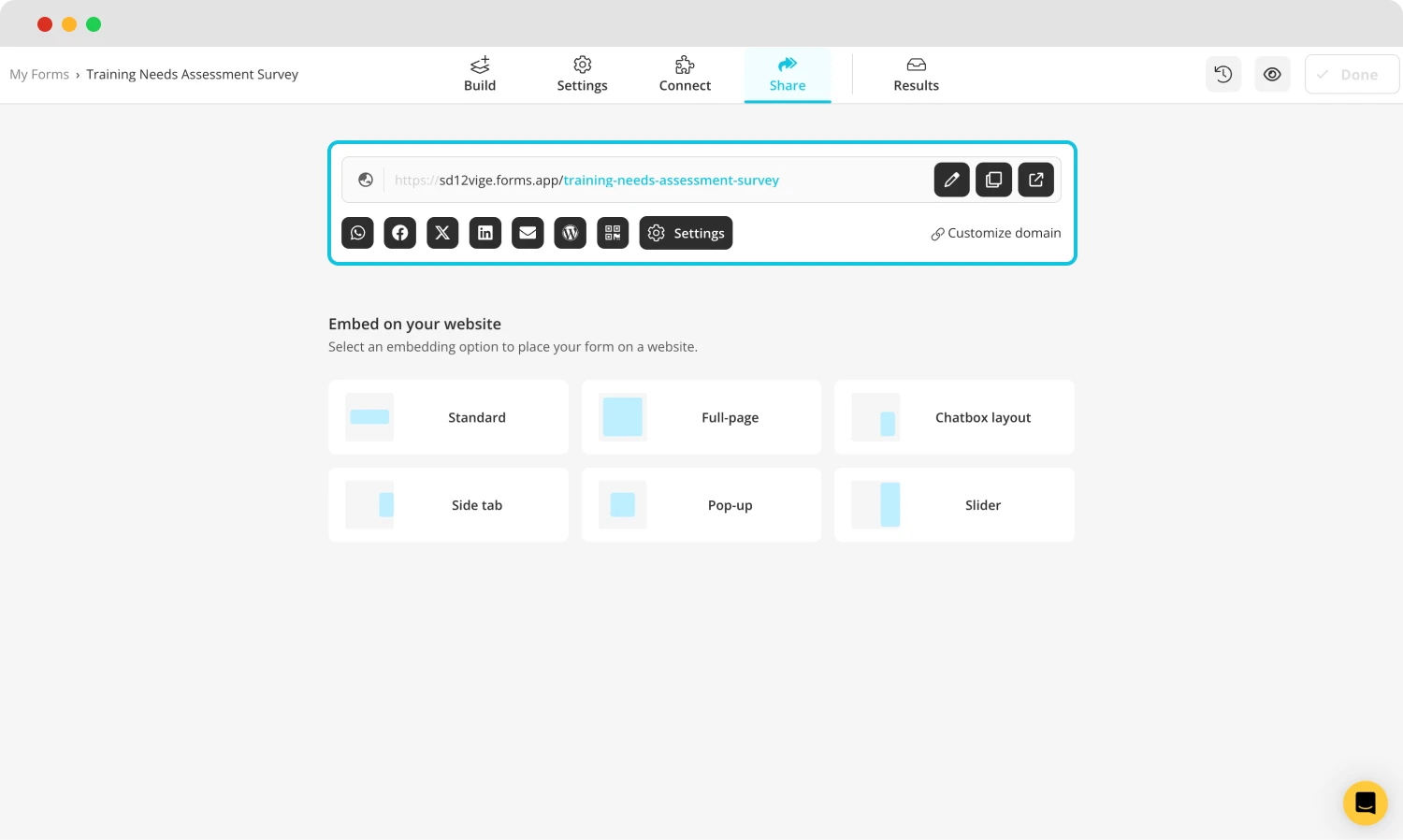
Share your survey
6 Expert tips to follow
Your training requirements survey will be more effective if you use these advanced ideas, which will yield more precise and useful results. Here are some expert tips for your inspiration for learning and development in creating training content:
🔍Determine focus groups
Incorporating focus groups into training needs surveys improves the caliber of information gathered, fortifies decision-making procedures, and eventually aids in creating focused and successful training programs that address the unique requirements of both businesses and individuals.
✅Make use of behaviorally anchored rating scales (BARS)
BARS can offer more nuanced feedback by tying responses to particular behaviors instead of abstract notions. Rather than posing the question, “Rate your teamwork skills,” you may ask, “How often do you collaborate with colleagues to achieve a common goal?”.
🕹️Put gamification features into practice
Including gamification components, such as interactive features, medals, and progress bars, can boost completion rates and engagement. This methodology can enhance the satisfaction of completing the survey and promote truthful and thorough answers.
🧪Test survey flow
To guarantee a seamless experience, test the survey flow before to completing it. With forms.app's preview tool, you can examine the survey from the viewpoint of a responder and make any necessary changes.
🎬Include multimedia components
Include components like photographs or movies to make questions more interesting and coherent. A brief video scenario may depict a problem at work and encourage responders to give more contextually relevant responses.
🧠Integrate conditional logic
Use forms.app's conditional logic tools to provide respondents with a more tailored and dynamic survey experience. This makes the survey relevant and interesting for every respondent by enabling certain items to appear based on prior responses.
Key points to take away
Organizations may successfully target areas for growth and assess present skills by collecting data through surveys or interviews. This procedure guarantees that staff performance is maximized, training activities are pertinent, and resources are distributed effectively.
Tools such as forms.app makes creating surveys easier, and customized surveys without coding knowledge are possible. Survey effectiveness may be increased by implementing professional advice such as focus groups, gamification, behaviorally anchored rating scales (BARS), and multimedia integration. You can access valuable feedback by creating surveys with forms.app!
Ayşegül is a content writer at forms.app and a full-time translation project manager. She enjoys scrapbooking, reading, and traveling. With expertise in survey questions and survey types, she brings a versatile skill set to her endeavors.
